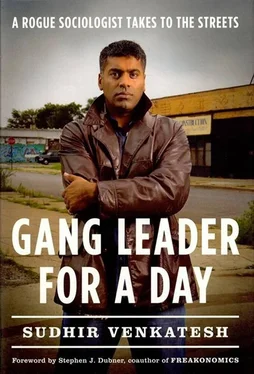J.T. cut him off. “Your auntie?! Nigger, are you kidding me? Ain’t no women allowed in this thing.”
“Well, she said that back in the day she was into selling dope,” the teenager continued. “She said that you should call her, because she could help you understand how to run a business.”
“All right, we’ll talk about this later, my man,” J.T. said, then turned to address the rest of the young men. “Listen, you all need to understand, we’re taking you to a whole ’nother level. We’re not talking about hanging out and getting girls. You’ll get all the pussy you want, but this is about taking pride in who you are, about doing something for yourself and your people. Now, we figure you got nobody serving around here. So there’s a real need-”
“Serving what?” the same teenager interrupted.
J.T. ignored him. “Like I said, you got no one responding to the demand, and we want to work with you-all. We’re going to set up shop.”
“Is there some kind of training?” asked a soft, sweet voice from the back. “And do we get paid to go? I got to be at White Castle on Mondays and Thursdays, and my mama says if I lose that job, she’ll kick me out of the house.”
“ White Castle?!” J.T. looked over in disbelief at T-Bone, Price, and me. “Nigger, I’m talking about taking control of your life. What is White Castle doing for you? I don’t get it-how far can that take you?”
“I’m trying to save up for a bike,” the boy replied.
Hearing that, J.T. headed for his car, motioning for Price to finish up with the group.
“We’ll be in touch with you-all,” Price said assertively. “Right now, you need to understand that we got this place, you dig? If anyone else comes over and says they want you to work with them, you tell them you are Black Kings. Got it?”
As Price continued speaking to the teenagers, I walked over to J.T. and asked if this meeting was typical.
“This shit is frustrating,” he said, grabbing a soda from the car. “There’s a lot of places where the kids ain’t really done nothing. They have no idea what it means to be a part of something.”
“So why do you want to do this?”
“Don’t have a choice,” he said. “We don’t have any other places left to take over.” Most city neighborhoods, he explained, were already claimed by a gang leader. It was nearly impossible to annex a territory with an entrenched gang structure unless the leader died or went to jail. Even in those cases, there were usually local figures with enough charisma and leverage to step in. This meant that J.T. had to expand into working- and middle-class neighborhoods where the local “gang” was nothing more than a bunch of teenagers who hung out and got into trouble. If today’s meeting was any indication, these gangs weren’t the ideal candidates for Black Kings membership.
“I can’t believe I’m doing this shit,” J.T. said, walking around his car, kicking stones in the dirt. Between the dual threats of arrest and demolition, he seemed to be coming to grips with the possibility that his star might have peaked.
The Black Kings weren’t the only ones anxious about the threat of demolition. All the tenants of Robert Taylor were trying to cope with the news. Although demolition wouldn’t begin for at least two years, everyone was scrambling to learn which building might come down first and where on earth they were supposed to live.
Politicians, including President Clinton and Mayor Richard J. Daley of Chicago, promised that tenants would be relocated to middle-class neighborhoods with good schools, safe streets, and job opportunities. But reliable information was hard to come by. Nor would it be so easy to secure housing outside the black ghetto. The projects had been built forty years earlier in large part because white Chicagoans didn’t want black neighbors. Most Robert Taylor tenants thought the situation hadn’t changed all that much.
The CHA began to hold public meetings where tenants could air their questions and concerns. The CHA officials begged for patience, promising that every family would have help when the time came for relocation. But there was legitimate reason for skepticism. One of the most inept and corrupt housing agencies in the country was now being asked to relocate 150,000 people living in roughly two hundred buildings slated for demolition throughout Chicago. And Robert Taylor was the largest housing project of all, the size of a small city. The CHA’s challenge was being made even harder by Chicago’s tightening real-estate market. As the city gentrified, there were fewer and fewer communities where low-income families could find decent, affordable housing.
Information, much of it contradictory, came in dribs and drabs. At one meeting the CHA stated that all Robert Taylor residents would be resettled in other housing projects-a frightening prospect for many, since that would mean crossing gang boundaries. At another meeting the agency said that some families would receive a housing voucher to help cover their rent in the private market. At yet another meeting it was declared that large families would be split up: aunts and uncles and grandparents who weren’t on the lease would have to fend for themselves.
With so much confusion in the air, tenants came to rely on rumors. There was talk of a political conspiracy whereby powerful white politicians wanted to tear down Robert Taylor in order to spread its citizens around the city and dilute the black vote. There was even a rumor about me: word was going around that I worked for the CIA, gathering secret information to help expedite the demolition. I assumed that this theory arose out of my attempt to procurea Department of Justice grant for the Boys & Girls Club, but I couldn’t say for sure.
Many tenants still clung to the idea that the demolition wouldn’t happen at all, or at least not for a long time. But I couldn’t find a single tenant who, regardless of his or her belief about the timing of the demolition, believed that the CHA would do a good job of relocation. Some people told me they were willing to bribe their building presidents for preferential treatment. Others were angry at the government for taking away their homes and wanted to stage protests to halt the demolition.
There was also a deep skepticism among tenants that their own elected leaders would work hard on their behalf. Ms. Bailey and other building presidents were being besieged by constituents desperate for advice.
One day I sat in Ms. Bailey’s office as she waited for a senior CHA official to show up for a briefing. Several other tenant leaders were also waiting, in the outer room. Ms. Bailey made no effort to hide the fact that she, along with most of the other tenant leaders, had already agreed to support the demolition rather than try to save the buildings. “The CHA made things perfectly clear to us,” she explained. “These buildings are coming down.” She spoke to me as if I were a five-year-old, with no understanding whatsoever of city politics. “Of course, you got a few people who think they can stop this, but I keep telling them, ‘Look out for your own family, and get out while you can.’ I’m looking out for myself.”
“What does that mean?” I asked.
“That means I got one shot to get what I can from the CHA for me and for my people. The CHA don’t have no money, Sudhir! They made that clear to us. And you know they just want to get us out of here, so I’m going to get something out of this.”
“Like what?”
“Well, I already told them I need a five-bedroom house in South Shore,” she said with a rich laugh. Then she told me the building presidents’ personal requests. “Ms. Daniels wants the CHA to give her son’s construction company a contract to help tear down the buildings. Ms. Wilson made a list of appliances she wants in her new apartment. Ms. Denny will be starting a new business, and the CHA needs to hire her to help relocate families.”
Читать дальше












